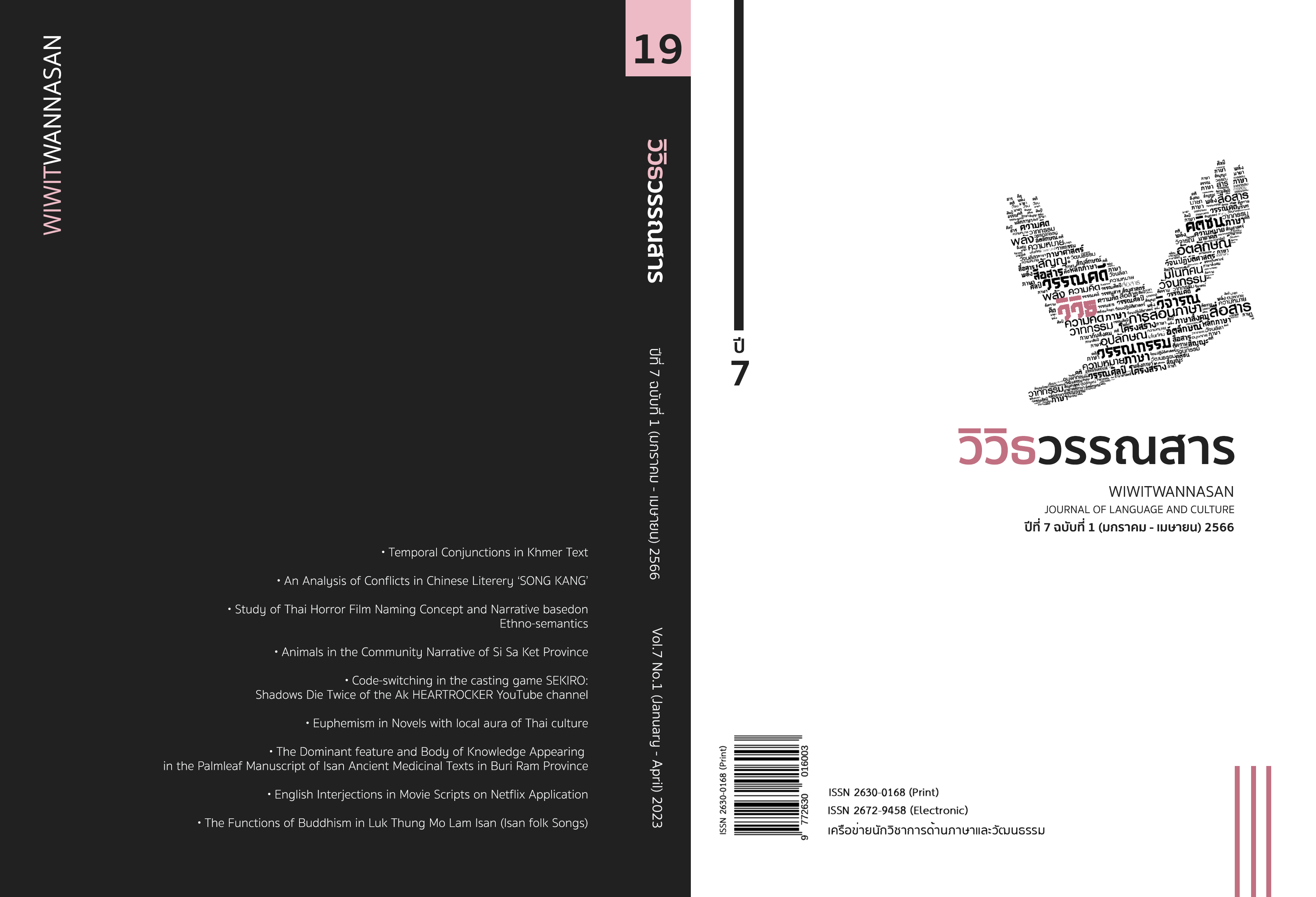การศึกษามโนทัศน์การตั้งชื่อและการเล่าเรื่องของหนังผีไทยตามแนวอรรถศาสตร์ชาติพันธุ์
Main Article Content
บทคัดย่อ
บทความนี้ มีวัตถุประสงค์เพื่อศึกษามโนทัศน์การตั้งชื่อและการเล่าเรื่องหนังผีไทยตามแนวอรรถศาสตร์ชาติพันธุ์ โดยใช้การวิเคราะห์ตัวบท ผลการศึกษาพบว่า ผู้ผลิตตั้งชื่อหนังผีและเล่าเรื่องผีด้วยมโนทัศน์ใดมโนทัศน์หนึ่ง หรือ เป็นมโนทัศน์ที่หลอมรวมเอาหลายมโนทัศน์มาไว้ในหนังเรื่องเดียว หรือมีมโนทัศน์ที่ท้าทายมโนทัศน์เดิม กล่าวคือ หนังผีก่อนปี 2547 มีลักษณะสอดคล้องกับมโนทัศน์ธรรมชาติและเรื่องเหนือธรรมชาติ รวมถึงมโนทัศน์ทางพระพุทธศาสนา เช่น ผีสามบาท ผีหัวขาด เฮี้ยน หนังผีระหว่างปี 2547-2551 สอดคล้องกับมโนทัศน์ทางวิทยาศาสตร์ โดยกล้องถ่ายภาพสามารถกดติดวิญญาณในเรื่องซัตเตอร์กดติดวิญญาณ ผีปรากฏในฟิล์มภาพยนตร์ ในเรื่องโปรแกรมหน้าวิญญาณอาฆาต หรือวัยรุ่นอยากรู้อยากลอง ในเรื่องลองของ ขณะที่ตั้งแต่ปี 2552 เป็นต้นมา หนังผีไทยสะท้อนมโนทัศหลังสมัยใหม่นิยม โดยเฉพาะหนังที่ผลิตโดย บริษัท GTH เช่น เรื่องพี่มากพระโขนง ห้าแพร่งตอนคนกอง ส่วนมโนทัศน์ชนชั้นทางสังคมแบบชายเป็นใหญ่ สอดแทรกอยู่ในทุกยุค เนื่องจากหนังไทยยังคงเน้นนำเสนอผีผู้หญิงเป็นหลัก เช่น เรื่อง นางนาก บุปผาราตรี ฝากไว้ในกายเธอ เป็นต้น
Article Details

อนุญาตภายใต้เงื่อนไข Creative Commons Attribution-NonCommercial-NoDerivatives 4.0 International License.
ลิขสิทธิ์ของบทความเป็นของวารสาร การพิมพ์ซ้ำจะต้องได้ร้บการอนุญาตจากบรรณาธิการวารสาร
เอกสารอ้างอิง
Boonmalert, P. (2011). Spirit Terms and Beliefs in Northern Thai Dialect. Humanities and Social Sciences. Veridian E-Journal SU. 4(1): 587-604. (In Thai)
Boonmee, T. (2009). World, Modern & Postmodern. Bangkok: Saitarn. (In Thai)
Charoenwong, S., & Chanrueang, T. (2020). Philosophy in film. Bangkok: Ploi. (In Thai)
Hengsuwan, M. (2014). An Ethnosemantic Study of The Terminology and Conceptual System of Ghosts and Spirits in Southeast Asian Languages. [Doctoral dissertation]. Chulalongkorn University. (In Thai)
Hongprayoon, S. (2007). Genres of television news programs in Thailand, 2005. [Master Degree Thesis]. Chulalongkorn University. (In Thai)
Jiranuntanaporn, S., & Singnoi, A. (2009). Tai Ethnic Tase Terms in the Lower Northern Part of Thailand: A case Study in Ethnosemantics. [Grant]. Naresuan University. (In Thai)
Jongthakul, P. (2018). The Process of Naming and Sinifying of Thai Fime Titlles and Thai Names 0f Amarican Films. [Master Degree Thesis]. Rangsit University. (In Thai)
Kaewthep, K. (2009). Media Analysis Concept and Techniques. Bangkok: Parbpim. (In Thai)
Kaewthep, K. (2010). New approaches in communication studies. Bangkok: Parbpim. (In Thai)
Ketthet, B.(2014). Human spirits, beliefs and dependencies between humans and ghosts. Maha Sarakham: Kakayia. (In Thai)
Kittikorn, R. (2003). Igniting dreams, Script writing day. Bangkok: Dokya. (In Thai)
Kullaphat, R. (1996). Plae-Kao: From Novel to Film. [Master Degree Thesis]. Chulalongkorn University. (In Thai)
Lordee, S. (2018). An Analysis of Spirit Terms In Lanna Language. [Grant]. Phayao University. (In Thai)
Louisyapong, K., & Hinwiman, S. (2009). Harmonize, Love, Confusion in Thai Film, Thai Film in the Past Three Decades (1977-2004), A Case Study of Horror Film, Love Film and Postmodern Film Genre. Bangkok: Siam. (In Thai)
Meetaisong, T. (2017). Spirit and Buddhism, A combination of beliefs. Bangkok: Inthaninpress. (In Thai)
Playnoi, S. (2009). Thai Ghost Legend. Bangkok: Pimkham. (In Thai)
Ponsan, S. (2017, September 8). Top 20 Thai ghost movies that make the most money of all time from all film studio. Mangozero. https://www.mangozero.com/20-best-thai-horror-movie-ever/ (In Thai)
Porapakpralai, J. (2010). Story maker. Bangkok: Children's Foundation. (In Thai)
Prasitrattasin, A., & others. (2012). Key figures and ideas in ethnosemantics: Approaching culture through language. Bangkok: Chulalongkorn University. (In Thai)
Rungwongpanich, N. (2018). Writing a dialogue in Television Script Writing Training with Professionals. [Unpublished manuscript]. (In Thai)
Sangmanee, W. (1998). Ghosts in literature. Bangkok: Dokya. (In Thai)
Thongpan, S. (2018). Sam Phraeng. Sarakadee. https://www.sarakadee.com/2018/01/29/samprang/ (In Thai)
Uitekeng, K. (2017). Parata-Siam? Ghost, Brahmin, Buddha?. Bangkok: Matichon. (In Thai)


